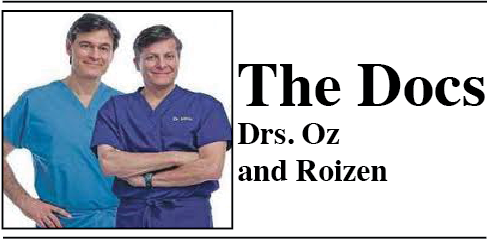CAMDEN — BY MICHAEL ROIZEN, M.D., AND MEHMET OZ, M.D.
Q: My friend Linda ended up in the hospital after a heart attack. She’s only 42. I never thought that could happen to a woman who was that young. Now I’m scared that I could be vulnerable too. What’s the risk for a woman in her 30s or early 40s? -- Janine R., Edison, New Jersey
A: Like you, many people think of a heart attack as an old person’s health crisis. After all, the average age for a first heart attack is 65 for men and 72 for women. But new research shows that cardiac events in adults 50 or younger do happen, and heart attacks in people 40 and younger are becoming more frequent. According to a 2018 study in Circulation, the proportion of heart attack hospital admissions attributable to young patients (35 to 54) steadily increased from 1995 to 2014, with the largest increase in young women.
Now, a study presented at the American College of Cardiology’s 68th Annual Scientific Session has compared “young” heart attack patients (41 to 50) with “very young” ones (40 and under). The researchers found the proportion of very young heart attack sufferers increased by 2 percent each year from 2006 to 2016, when 20 percent of heart attack patients were age 40 or younger! In related research, 20 percent of folks 50 and younger who had a heart attack also had diabetes, in addition to more conventional heart attack risks. The youngest patients were nearly twice as likely to abuse marijuana and cocaine.
So if you’re 50 or younger and are overweight or obese, have diabetes, elevated LDL cholesterol or high blood pressure or use recreational drugs, don’t think that you can put off a campaign to become healthier.
Talk with your doc, then start a five-days-a-week exercise routine (walking, swimming, biking). Ditch red and processed meats, highly processed packaged foods, and sugar- and syrup-added beverages and foods. Practice mindful meditation 10 minutes a day. That’ll get to the heart of the problem!
Q: I have several job interviews coming up for tech services in law firms, and all require drug screening. I don’t do any drugs -- I don’t even drink -- but I heard that you can test positive for a controlled substance if you eat, for instance, a poppy seed bagel. Is that true? What else should I stay clear of? -- Jason B., Austin, Texas
A: You are correct about the poppy seed bagel, because a poppy is a poppy -- they naturally have the compounds that are present in morphine and codeine. Most labs have raised the bar for false positives from poppy seeds, but you never know, so stay clear of those for a couple of weeks just to be safe.
Tonic water has been known (super rare) to raise a red flag about drug use because it’s been used in manufacturing some street drugs; certain antibiotics can lead to false positive results for opiates; a few over-the-counter cold medications contain ingredients such as the antihistamine brompheniramine, which could lead to a false positive result for amphetamines, including methamphetamine; and of course secondhand marijuana smoke can cause you trouble for obvious reasons. Properly prescribed anti-anxiety drugs, painkillers or sleep medications can indicate barbiturate use.
By and large though, drug screening has become pretty sophisticated, since students, athletes and government employees all test regularly and the stakes are very high. However, it has been reported that false positives may affect 5 to 10 percent of all tests. If it happens to you, demand another test and then hire a third party to test you and have the results sent both to you and your future employer.
Nothing is perfect and nothing is foolproof. Make sure to tell all responsible parties if you are taking any cold medications, blood pressure or pain meds, even ibuprofen. Good luck with the interviews, and don’t be nervous about your tests if you haven’t been taking recreational drugs.
•••
(Mehmet Oz, M.D. is host of "The Dr. Oz Show," and Mike Roizen, M.D. is chief wellness officer and chair of Wellness Institute at Cleveland Clinic. Email your questions to Dr. Oz and Dr. Roizen at youdocsdaily(at sign)sharecare.com. Distributed by King Features Syndicate, Inc.)

